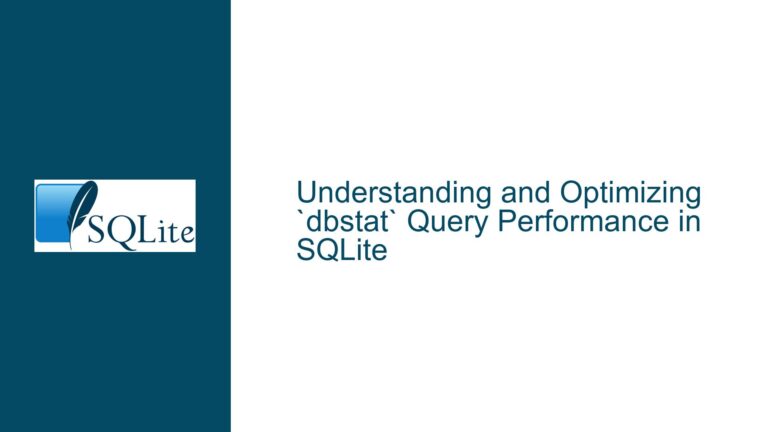Optimizing FTS5 Prefix Queries for Autocomplete Functionality in SQLite
Slow Performance of LIKE Queries on FTS5 Vocabulary Tables
When implementing an autocomplete feature using SQLite’s FTS5 (Full-Text Search) module, a common requirement is to quickly retrieve terms that match a given prefix. For instance, if a user types "hous", the system should efficiently return terms like "house", "housed", and "housing". A straightforward approach is to use the LIKE operator on the FTS5 vocabulary table, as shown in the query SELECT * FROM test_vocab WHERE term LIKE 'hous%'. However, this method can be prohibitively slow, especially with large indexes, often taking several seconds to execute. In contrast, querying the FTS5 index itself using the MATCH operator, such as SELECT * FROM testindex WHERE body MATCH 'hous*', is nearly instantaneous. This discrepancy in performance raises the question: why is the LIKE query on the vocabulary table so slow, and how can we optimize it to match the speed of FTS5 index queries?
The FTS5 vocabulary table, which stores the terms indexed by FTS5, is essentially a standard SQLite table. When you use the LIKE operator with a wildcard (%), SQLite must perform a full table scan to find all terms that match the pattern. This is because the LIKE operator does not leverage any indexes, even if they exist on the term column. As a result, the query performance degrades significantly as the size of the vocabulary table grows. On the other hand, the FTS5 index is specifically designed for fast text searches, including prefix searches, by using specialized data structures like inverted indexes. This is why the MATCH operator is so much faster.
Inefficient Use of LIKE and Lack of Index Utilization
The primary cause of the slow performance is the inefficient use of the LIKE operator in conjunction with a wildcard at the end of the search term. The LIKE operator is not optimized for prefix searches, and SQLite does not use indexes to speed up such queries. When you run a query like SELECT * FROM test_vocab WHERE term LIKE 'hous%', SQLite has to scan every row in the test_vocab table to find terms that start with "hous". This results in a time complexity of O(n), where n is the number of rows in the table. For large vocabulary tables, this can be extremely slow.
Another factor contributing to the inefficiency is the case sensitivity of the LIKE operator. By default, LIKE is case-insensitive, which means that SQLite must perform additional comparisons to match terms regardless of their case. This further increases the computational overhead of the query. While SQLite does support case-sensitive LIKE queries through the PRAGMA case_sensitive_like setting, this is not the default behavior and must be explicitly enabled.
Additionally, the LIKE operator does not take advantage of the underlying B-tree indexes that SQLite uses for standard columns. Even if you have an index on the term column, it will not be used for LIKE queries with a leading wildcard. This is because the B-tree index is optimized for exact matches and range queries, not for pattern matching with wildcards. As a result, the query planner has no choice but to perform a full table scan.
Leveraging Range Queries and GLOB for Faster Prefix Searches
To optimize prefix searches on FTS5 vocabulary tables, we can use alternative query patterns that are more efficient than LIKE. One such approach is to use range queries with the >= and < operators. For example, the query SELECT * FROM test_vocab WHERE term >= 'hous' AND term < 'hout' will return all terms that start with "hous". This works because the >= and < operators can leverage the B-tree index on the term column, resulting in a much faster query. The time complexity of this approach is O(log n), which is significantly better than the O(n) complexity of the LIKE operator.
Another option is to use the GLOB operator, which is similar to LIKE but is case-sensitive and uses a different pattern matching syntax. The query SELECT * FROM test_vocab WHERE term GLOB 'hous*' will also return all terms that start with "hous". Like the range query approach, the GLOB operator can take advantage of the B-tree index, leading to improved performance. However, it is important to note that GLOB is case-sensitive, so it will only match terms with the exact case as specified in the query.
If you prefer to stick with the LIKE operator, you can improve its performance by enabling case-sensitive matching. This can be done by setting the PRAGMA case_sensitive_like option to ON. While this will not allow the LIKE operator to use the B-tree index, it will reduce the number of comparisons SQLite has to perform, resulting in a modest performance improvement. The query would look like this: PRAGMA case_sensitive_like = ON; SELECT * FROM test_vocab WHERE term LIKE 'hous%'.
In summary, the key to optimizing prefix searches on FTS5 vocabulary tables is to avoid the LIKE operator with wildcards and instead use range queries or the GLOB operator. These approaches leverage the underlying B-tree index, resulting in significantly faster query performance. Additionally, enabling case-sensitive LIKE queries can provide a modest performance boost if you need to stick with the LIKE operator. By implementing these optimizations, you can achieve near-instantaneous prefix searches that are on par with the performance of FTS5 index queries.
Implementing PRAGMA journal_mode and Database Backup
While optimizing queries is crucial for performance, it is also important to ensure the integrity and reliability of your SQLite database, especially when dealing with large datasets and frequent write operations. One way to enhance database reliability is by configuring the PRAGMA journal_mode. The journal mode determines how SQLite handles transactions and recovery in the event of a crash or power failure. The default journal mode is DELETE, which creates a temporary rollback journal file that is deleted after each transaction. However, this mode can be slow for large transactions and may not provide the best performance for write-heavy workloads.
A more robust option is to use the WAL (Write-Ahead Logging) journal mode. In WAL mode, changes are written to a separate WAL file instead of the main database file. This allows for concurrent read and write operations, improving performance and reducing contention. To enable WAL mode, you can execute the following command: PRAGMA journal_mode=WAL;. Once enabled, SQLite will use the WAL file to track changes, and the main database file will only be updated during a checkpoint operation. This can significantly improve performance for both read and write operations, especially in multi-user environments.
Another important consideration is database backup. Regular backups are essential to protect against data loss due to hardware failure, software bugs, or user errors. SQLite provides several methods for backing up databases, including the .backup command in the SQLite command-line interface and the sqlite3_backup API for programmatic backups. The .backup command creates a copy of the entire database, including all tables, indexes, and data. For example, you can use the following command to back up a database: .backup main backup.db. This will create a backup of the main database in the file backup.db.
For more advanced backup strategies, you can use the sqlite3_backup API, which allows for incremental backups and more fine-grained control over the backup process. This API can be used to create a backup of a live database without blocking other operations, making it ideal for applications that require high availability. Additionally, you can use third-party tools and scripts to automate the backup process and ensure that backups are performed regularly and stored securely.
In conclusion, optimizing query performance is only one aspect of managing an SQLite database. By configuring the PRAGMA journal_mode to use WAL and implementing a robust backup strategy, you can enhance the reliability and performance of your database, ensuring that it remains stable and recoverable even in the face of unexpected failures. These practices, combined with the query optimization techniques discussed earlier, will help you build a high-performance and resilient application that leverages the full power of SQLite’s FTS5 module.






